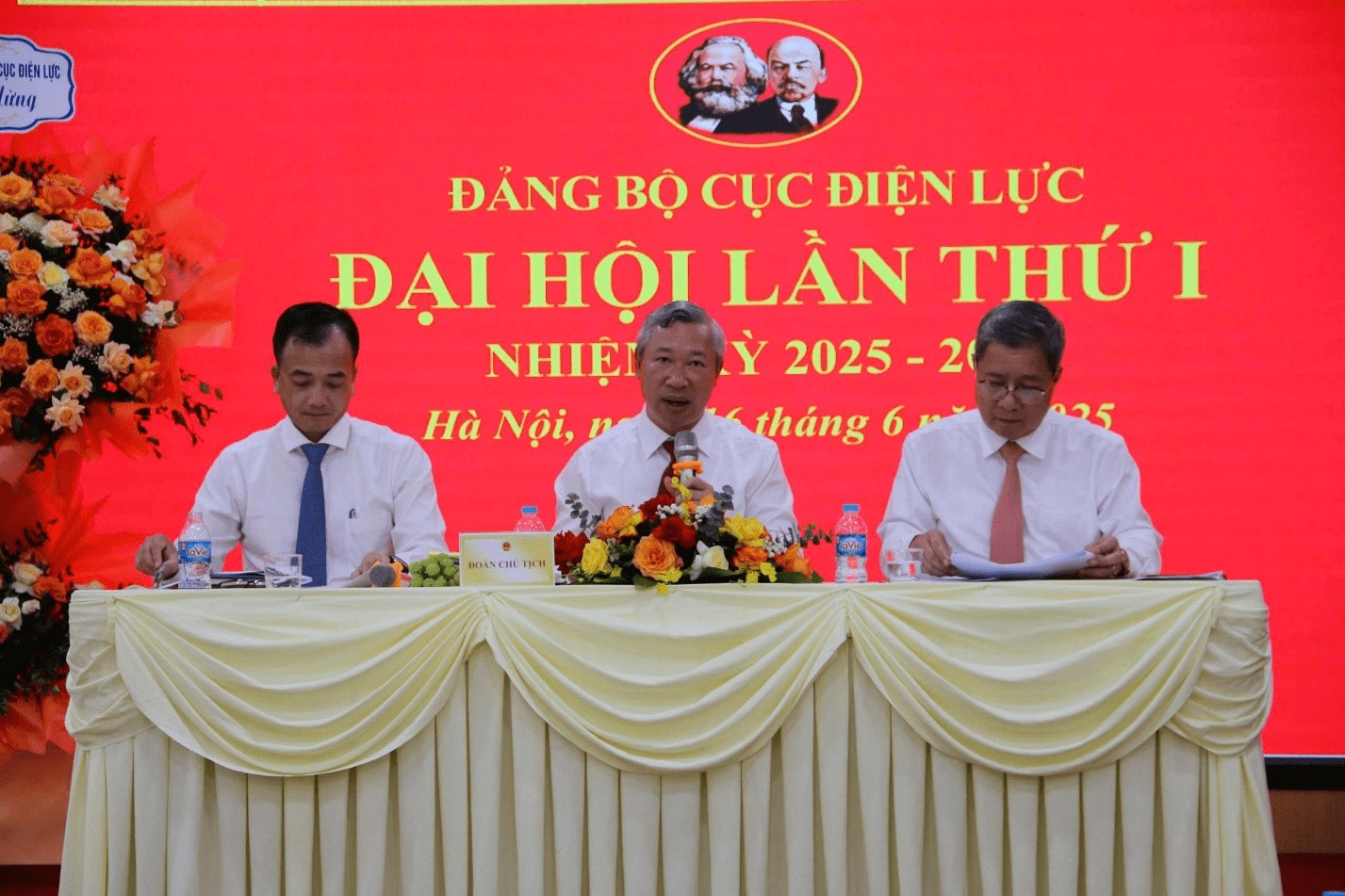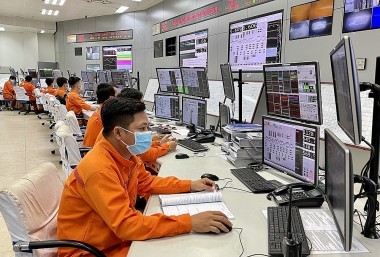Strategic Orientation for the Operations of the Electricity Authority in the New Development Phase (2025–2030)
08:43 | 19/06/2025
During the 2020–2025 period, under the leadership of the Party Committee of the Ministry of Industry and Trade, the Electricity Authority achieved significant accomplishments in state management of the power sector. These achievements contributed to ensuring energy security, promoting sustainable development, and enhancing the efficiency of Vietnam’s electricity industry.
 |
| Mr. Phạm Nguyên Hùng – Party Secretary and Director General of the Electricity Authority (center) at the 1st Party Congress of the Electricity Authority for the 2025–2030 term. |
Organizational streamlining
In line with the policy of streamlining organizational structure and operations, the Electricity Regulatory Authority was established through the merger of the Renewable Energy and Electricity Authority with the former Electricity Authority. During the restructuring process, the Authority reorganized its internal departments—reducing six units, equivalent to a 40% decrease—and consolidated its affiliated Party cells, cutting down by two units (a 30% reduction). These efforts contributed to building a lean, efficient, and effective organizational apparatus.
Institutional Development
During the 2020–2025 term, the Party Committee of the Electricity Authority guided the issuance of 51 legal normative documents, thereby establishing a coherent legal framework and enhancing the effectiveness of state management in the power sector.
A key highlight is the Electricity Law of 2024—a landmark piece of legislation that addresses long-standing institutional bottlenecks, improves the investment and business environment, and accelerates the development of renewable energy. The law aligns closely with the Party’s directives and concretizes policies on energy transition, the development of a competitive electricity market, decentralization and delegation of authority, and administrative reform. It lays the foundation for a unified legal corridor to ensure a reliable electricity supply while supporting sustainable development and international integration.
Sustainable and Efficient Power Generation Restructuring
During the 2020–2025 period, Vietnam’s national power generation mix underwent a significant transition toward sustainability. Renewable energy experienced rapid growth, accounting for 26.8% of total installed capacity and 13.4% of electricity output. Hydropower maintained its stabilizing role, contributing 28.5% of capacity and 25% of generation. Meanwhile, 11 thermal power centers continued to serve as key pillars in ensuring a stable electricity supply.
The Party Committee of the Electricity Authority directed intensified inspection efforts, resolved regulatory and operational bottlenecks, and rigorously appraised projects to ensure investment progress and quality.
Electricity Pricing Mechanism Reform and Market Transparency Enhancement
The Electricity Authority has advised on the development and refinement of the electricity pricing adjustment mechanism to ensure timely reflection of input cost fluctuations, reasonable cost recovery, and appropriate profit margins for power enterprises. To date, the Ministry of Industry and Trade has issued 11 electricity generation price brackets covering various types of power plants, as well as a framework for imported electricity prices, along with detailed guidelines on transitional pricing mechanisms for solar and wind power projects.
The competitive wholesale electricity market, which has been in operation since 2019, continued to make notable progress during the 2020–2025 period. An increasing number of market participants has helped improve competitiveness, transparency, and fairness in power dispatching, strengthening investor confidence and supporting the development of a healthy electricity market ecosystem.
The Government has issued a Decree on the Direct Power Purchase Agreement (DPPA) mechanism between renewable energy generators and large electricity consumers—an important milestone in promoting sustainable renewable energy development and paving the way for a competitive retail electricity market in Vietnam.
As part of the power sector restructuring process, a key task is the separation of the National Load Dispatch Center (EVNNLDC – A0) from EVN and its transformation into a state-owned limited liability company under the Ministry of Industry and Trade, renamed the National Power System and Market Operator (NSMO). This reform is designed to ensure the independence and objectivity of system operation and electricity market management, thereby advancing the development of a competitive, transparent, and efficient power market.
Power Strategy and Planning – Advancing Green Energy
On May 15, 2023, the Prime Minister issued Decision No. 500/QĐ-TTg approving Power Development Plan VIII (PDP8) for the period 2021–2030, with a vision to 2050. The plan sets a clear direction toward prioritizing the development of clean and environmentally friendly energy sources, with a strong emphasis on mitigating climate impacts.
Notably, PDP8 stipulates that no new coal-fired power projects will be developed, and the share of coal in the power mix will be gradually reduced, marking a decisive step toward a greener and more sustainable energy structure.
Implementation of Power Development Plan VIII and Electricity Sector Development Strategies
Power Development Plan VIII (PDP8) was revised under Decision No. 768/QĐ-TTg dated April 15, 2025, with adjusted projections for generation and transmission capacity to align with a high-load growth scenario, ensuring sufficient electricity supply for socio-economic development.
The Party Committee of the Electricity Authority has provided strong leadership in advising, appraising, and submitting for approval several key strategic documents, including the Vietnam Electricity Sector Development Strategy (Decision No. 262/QĐ-TTg dated April 1, 2024) and the Implementation Plan for PDP8 (Decision No. 1682/QĐ-TTg dated December 28, 2024). In parallel, the Authority has actively reviewed and monitored the progress of PDP8 implementation, assessed project adjustments and interconnection schemes, and contributed feedback to power development planning across all 63 provinces and cities.
These achievements further affirm the pioneering role and significant contributions of the Electricity Authority in shaping a modern, sustainable, and efficient power sector, meeting the evolving development needs of the country in the new era.
 |
| Delegates attending the 1st Party Congress of the Electricity Authority for the 2025–2030 term. |
Objectives and Strategic Orientation for the 2025–2030 Period
The Electricity Authority sets forth the overarching goal of taking the lead in institutional reform, spearheading the sustainable energy transition, ensuring a safe, reliable, and reasonably priced electricity supply, and actively promoting international integration—thereby contributing to the national goal of achieving Net Zero emissions by 2050. Accordingly, the Authority will implement the following key task groups:
1. Enhance the institutional framework for the power sector to create a favorable environment that attracts investment in electricity infrastructure and development.
2. Ensure a stable and secure power supply to support socio-economic growth, while promoting a sustainable transition in the power generation mix.
3. Regulate electricity prices based on market mechanisms, with greater transparency and accountability in electricity production and business operations.
4. Proactively provide timely policy advice to ensure a reliable electricity supply, especially during peak demand periods.
5. Focus on resolving bottlenecks and obstacles related to generation and transmission projects under the Ministry of Industry and Trade’s authority, thereby accelerating progress and securing power supply.
6. Design and finalize a roadmap and legal framework for a competitive electricity market, in line with evolving demands and new development contexts.
7. Strengthen international cooperation and develop programs/projects to effectively mobilize technical, financial, and technological resources for the development of renewable and new energy.
8. Ensure timely and compliant administrative procedures to enhance service quality for businesses and the public.





